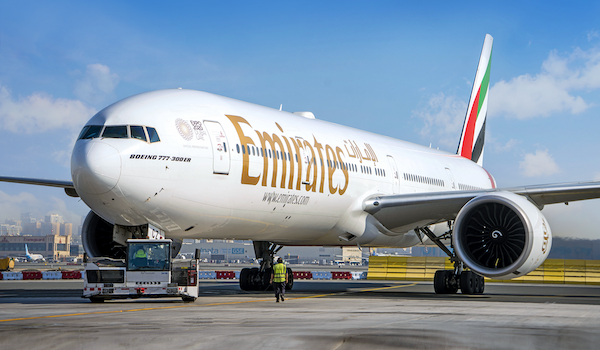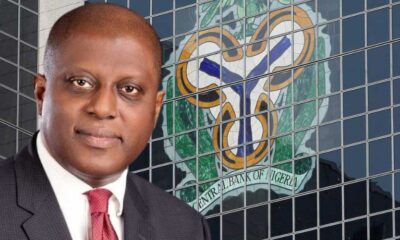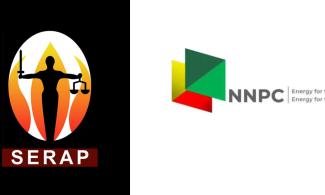Top Story
Account for N400bn saved on subsidy or face legal action — SERAP to Tinubu
The Socio-Economic Rights and Accountability Project (SERAP) has challenged Nigeria’s President, Bola Ahmed Tinubu to publish the accounts of how the 400billion saved on the removal of subsidy has been spent.
President Tinubu had in his inaugural speech in May announced the removal of subsidy on Premium Motor Spirit (PMS) declaring that the cost is unsustainable for the government to bear.
Following the implementation of the policy to remove subsidy, the Group Chief Executive Officer of the Nigerian National Petroleum Company Limited (NNPCL), Mr Mele Kyari revealed that the country was saving 400billion monthly by removing subsidy.
In the letter dated 1 July 2023 and signed by SERAP deputy director Kolawole Oluwadare, the organisation said: “Your government has a legal responsibility to ensure that the savings from the removal of subsidy on petrol are spent solely for the benefit of the 137 million poor Nigerians who are bearing the brunt of the removal.”
SERAP said, “Prevention of corruption in the spending of savings from the removal of subsidy on petrol and preventing and addressing the challenges caused by the removal are serious and legitimate public interests.”
According to SERAP, “Nigerians have the right to know how the savings are spent. Publishing the details of the spending of the savings would promote transparency, accountability, and reduce the risks of corruption in the spending of the funds.”
The letter, read in part: “SERAP is concerned that the savings from subsidy removal may be embezzled, misappropriated or diverted into private pockets.
“Opacity in the spending of the savings from subsidy removal would have negative impacts on the fundamental interests of the citizens and the public interest.”
“We would be grateful if the recommended measures are taken within 7 days of the receipt and/or publication of this letter. If we have not heard from you by then, SERAP shall consider appropriate legal actions to compel your government to comply with our request in the public interest.
“Unless the government is transparent and accountable to Nigerians in how it spends the savings from the removal of subsidy on petrol, the removal will continue to undermine the rights of Nigerians, and increase their vulnerability to poverty and social deprivation.
“Transparency would ensure that the funds saved from the removal of subsidy are not diverted into private pockets, and increase public trust and confidence that these savings would be used to benefit Nigerians.
“The implementation of the National Social Safety Net Programme (NASSP) and spending on the programme have been mostly shrouded in secrecy.
“Publishing the details of the spending of the N400bn and other savings from the removal of subsidy would also ensure that persons with public responsibilities are answerable to the people for the performance of their duties including the management of the funds.
“Transparency and accountability in the spending details of the N400bn saved as a result of the removal of subsidy on petrol, and on the spending of subsequent savings from the removal would mean that the savings can help poor Nigerians to overcome the effects of such removal.
“It would also help to avoid a morally repugnant result of double jeopardy on poor and socially and economically vulnerable Nigerians.
”The lack of transparency and accountability in the spending of savings from the removal of subsidy on petrol and the resulting human costs would directly threaten fundamental human rights that your government has an obligation to protect.
“Your government has the legal obligations to address the effects of subsidy removal on the human rights of 137 million poor Nigerians, and to prevent and address some of the direst consequences that the removal may reap on human rights, especially given the disproportionate impact on these Nigerians.
“SERAP also urges you to promptly instruct Independent Corrupt Practices and Other Related Offences Commission (ICPC) and Economic and Financial Crimes Commission (EFCC) to monitor the spending of all savings from subsidy removal.
“SERAP notes that the removal of subsidy on petrol continues to negatively and disproportionately affect poor Nigerians, undermining their right to adequate standard of living.
“Your government has a positive obligation to protect individuals against the threat posed to human rights by the removal of subsidy on petrol. Your government also has legal obligations to effectively address the aftermath of subsidy removal,” a portion of the letter read
Top Story
Account enrollment: Court validates CBN’s regulation, permits collection of customers’ social media handles


…Dismisses concerns, says social media handles not protected by privacy rights
…Financial institutions cleared to collect social media handles for KYC
By Sodiq Adelakun
The Federal High Court in Lagos has ruled in favour of the Central Bank of Nigeria (CBN) in a case challenging the regulation that requires financial institutions to collect their customers’ social media handles as part of the Know-Your-Customer (KYC) procedure.
Recall that the Socio-Economic Rights and Accountability Project (SERAP) had urged the court to compel CBN to withdraw its directive to banks and other financial institutions.
However, in the ruling, Justice Nnamdi Dimgba struck out the suit filed by Lagos-based lawyer, Chris Eke, who argued that the regulation violates the right to privacy of bank customers.
Eke had sought a declaration that the regulation contained in Section 6(a) (iv) of the Central Bank of Nigeria (Customer Due Diligence) Regulations, 2023, is undemocratic, unconstitutional, null, and void, as it contradicts Section 37 of the 1999 Constitution of the Federal Republic of Nigeria (as amended). However, Justice Dimgba ruled that the regulation does not breach the right to privacy of bank customers.
The CBN regulation is targeted to enhance customer due diligence and anti-money laundering measures, and requires banks to collect social media handles, among other personal information, from their customers.
The applicant had asked the court to grant an order of perpetual injunction, restraining CB from enforcing the regulation which requires financial institutions to request customers’ social media handles as part of normal bank customer due diligence requirements.
The CBN in its response to the suit, filed a notice of preliminary objection, challenging the competence of the suit. The apex bank also disagreed that the said regulation constitutes any interference with the private life of the applicant, as claimed.
The judgment came as Justice Dimgba dismissed a suit, stating that the notice of preliminary objection held merit and consequently struck out the case.
During the proceedings, Justice Dimgba emphasised that providing a social media handle is akin to furnishing email addresses, phone numbers, and other contact details for banking purposes.
He argued that such information aids in conducting due diligence to ascertain if an individual is suitable for conducting business with a bank.
Justice Dimgba further explained that the essence of having a social media account implies a willingness to engage in public communication, thus rendering privacy concerns unfounded.
According to him, “First, the Applicant claims that the requirements on the CBN Regulations for financial institutions to request and collect the social media handle of its customers as part of KYC infringes on his right to privacy.”
“This claim is very ambitious and amounts to a very far throw. The said Regulations are directed to and apply to financial institutions. It does not apply to private individuals such as the Applicant.
“Even if, as appears to be argued, that the Regulations itself would inevitably affect the Applicant, this claim is speculative for the simple reason that in nowhere in the affidavit in support was it stated that the Applicant operates an account with a financial institution and that the said institution had demanded his social media handle. So the suggestion that he would be affected by this Regulation, albeit negatively, is very speculative and at large.
“Secondly, there is also no deposition to the effect that any financial institution had begun to implement this Regulation and that its implementation had begun to create disruptions and inconvenience against the general population, in which case one could infer that the suit should be legitimated as a public interest litigation.
“Thirdly, assuming even that the banks had begun to implement these regulations, the applicant assuming he maintained any bank accounts or sought to open one, but is being hindered or irritated by the requirement of the Regulation to avail his social media handle as part of KYC, the Applicant still had a choice, which is to refuse to do business with any bank insisting on the information as part of its social media handle, but to seek other alternatives.
“Fourthly, and for all it is worth, I do not see how asking a banking or potential banking customer to provide his social media handle can ever amount to a breach of privacy.
“Granted that Section 37 of the Constitution of the Federal Republic of Nigeria 1999 (as amended) provides inter alia: The privacy of citizens, their homes, correspondence, telephone conversations and telegraphic communications is hereby guaranteed and protected.
“My view is that the provision of a social media handle is of the same genre as the provision of email address, phone numbers and other means by which a potential customer of a bank can be contacted.
“Thus, it is clear from the face of the Regulations as set out above that email addresses, phone numbers and social media handles are all provided for under clause 6iv just to show that the aim was not to pry on anyone but rather to provide alternative ways by which a customer of the bank can be contacted, and or due diligence conducted on the person to determine if the person is a fit and proper person to extend banking services to.
“I do not see how this infringes on the right to privacy. I should even say that the essence of having a social media account was for one to be publicly visible communication-wise. It, therefore, appears quite ironic, though wryly, that one can suggest that asking for information about a social media handle with which the individual exposes and immerses himself or herself in the public, can amount to a violation of privacy rights, which rights itself is all about isolation of one from public glare.
“It is also to my knowledge that even in filling some business applications, personal information of this sort, is sometimes requested, and parties generally oblige. If it does not constitute a breach of privacy, why should it now?
“A social media handle is left at large for the world to see, being in the public space, everyone enjoys the liberty to have access to it whether or not consent was obtained. It would be highly unreasonable to hold the Respondent in breach of privacy for what other persons have access to.
“The apprehension of the Applicant of his social interactions being monitored is manifestly speculative in itself and rather incredulous to believe that the financial institutions have the luxury of time to concern itself with such frivolities.
“On the whole, if I did not sustain the NPO, I would have dismissed the suit for the reasons stated. But the NPO having been sustained, the suit is therefore hereby struck out.”
Top Story
N1.3trn power debt: Tinubu approves payment, unveils plan to liquidate gas debts


President Bola Ahmed Tinubu has given approval for the payment of N1.3trn legacy debts owed power generation companies.
Minister of Power, Chief Adebayo Adelabu speaking at the 8th Africa Energy Market Place 2024 in Abuja said that President Bola Tinubu has approved a plan to liquidate the debts.
According to him, “Mr. President has approved the submission made by the Minister of State Petroleum (Gas) to defray the outstanding debts owed to the gas supply companies to power generation companies. The payments are in two parts, the legacy debts and the current debts. For the current debt, approval has been given to pay about N130 billion from the gas stabilisation fund which the Federal Ministry of Finance will pay.”
“The payment of the legacy debt will be made from future royalties in exchange for incomes in the gas subsector which is quite satisfactory to the gas suppliers. This will allow the companies to enter into firm contracts with power generation companies.
“For the power generation companies, the debt is about N1.3 trillion and I can also tell you that we have the consent of the President to pay, on the condition that the actual figures are reconciled between the government and the companies. This we have successfully done and it is being signed off by both parties now. Majority has signed off and we are engaging to ensure that we have 100 percent sign off.
“The debt will be paid in two ways, immediate cash injection and through a guaranteed debt instrument, preferably a promissory note. This assures the companies that in the next three to five years, the government is ready to defray these debts.”
The Minister further stated that the government was working to get the distribution companies solvent and effective by unbundling their operations along state boundaries.
He insisted that the areas covered by the current DisCos were too large for them to deliver effective services to consumers.
In the same vein, the Chairman of the Nigerian Electricity Regulatory Commission (NERC), Engr. Sanusi Garba lamented the poor financial state of the DisCos, noting that it is difficult for them to raise the needed capital to invest.
Engr. Garba pointed out that the challenges facing the sector were a culmination of all past inactions and missteps by those saddled with the responsibilities of managing the sector both at policy and operational levels.
According to him, “Today when you look at distribution companies they are clearly and technically insolvent, and you also want them to raise capital in terms of debt or equity. It’s a Herculean task. I also want to mention that implementing the power sector reform requires very strong political will to implement decisions that impact on the wider public.”
However, the African Development Bank (AfDB) disclosed that it has so far spent over $450 million to support various power sector projects and programmes with another $1 billion planned to support the power sector reform effort by the government.
Top Story
Emirates Airline to resume Lagos-Dubai flights October 1


Emirates Airline has disclosed that it will resume services to Nigeria from October 1, 2024, operating a daily service between Lagos and Dubai.
This development was announced in a statement on Thursday by the airline, which has its hub in the United Arab Emirates (UAE).
The airline disclosed that flight services will be operated using a Boeing 777-300ER.
“We are excited to resume our services to Nigeria. The Lagos-Dubai service has traditionally been popular with customers in Nigeria and we hope to reconnect leisure and business travellers to Dubai and onwards to our network of over 140 destinations.
“We thank the Nigerian government for their partnership and support in re-establishing this route and we look forward to welcoming passengers back onboard,” Emirates’ Deputy President and Chief Commercial Officer, Adnan Kazim, said.
Recall that Emirates Airlines had suspended its Dubai-Lagos flights in 2022 over its inability to repatriate trapped funds in Nigeria in the heat of the diplomatic row between the two countries.
This comes after Festus Keyamo, Minister Of Aviation And Aerospace Development in a post on his X (formerly Twitter) page had disclosed that he got correspondence from Emirates Airline when he visited Salem Saeed Al-Shamsi, ambassador of the United Arab Emirates (UAE) in Abuja.
”Yesterday, I paid a working visit to the Ambassador of the UAE to Nigeria, His Excellency, Salem Saeed Al-Shamsi at the UAE Embassy in Abuja. He handed me a correspondence from the Emirates Airline indicating a definite date for their resumption of flights to Nigeria,” Keyamo said.
-
Finance4 months ago
Court orders Sen. Victor Umeh to repay N136m bank debt to AMCON
-



 Abuja Update3 months ago
Abuja Update3 months agoUNDP, FG partnership needed to achieve inclusion, equity- Minister
-
Abuja Update2 months ago
Banks drive stock market performance with N147bn gain
-
capital market2 years ago
Rt.briscoe, FBNH, Others halts negative performance of stock market
-
Submission Guidelines4 months ago
CALL FOR SUBMISSIONS: POETRY COLUMN-NND
-



 Health1 month ago
Health1 month agoCapacity training will reduce migration of health workers- NPHCDA
-



 Business4 weeks ago
Business4 weeks agoTingo Group unveils Tingo Electric, Tingo Cola drink at Lagos launch
-
News5 months ago
Oil thieves sponsoring malicious media campaign against Navy – Spokesman










